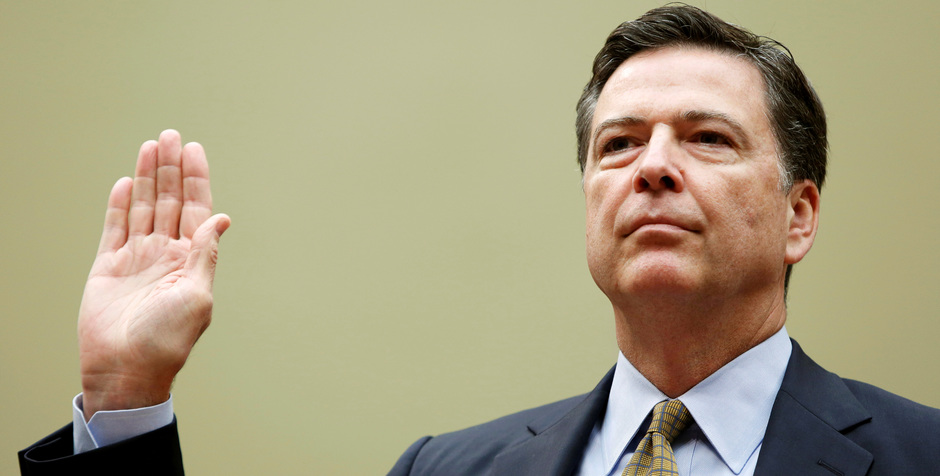False Congressional Testimony and the FBI’s Defective Investigation
In the past week, Americans have continued to wrestle with questions about whether the United States is a nation of laws or a nation of men. Either we are going to be a nation committed to the equal treatment for everyone before the law or we aren’t.
Since our nation’s commitment to the rule of law is a fundamental keystone of our republic, the FBI’s recent behavior remains confusing, confounding, and mystifying.
Despite this commitment, FBI Director Comey’s news conference on Tuesday July 5, 2016 explaining his decision not to issue a criminal referral and his Congressional testimony last week render a number of essential facts obvious to reasonable observers.
First, despite former Secretary Clinton’s denials to the contrary, she (1) sent and received classified materials while using her private email server; (2) transmitted emails that were classified at the time they were sent and some of the classified emails contained markings demonstrating that they contained classified material at the time they were transmitted; (3) failed to turn over all of her work-related correspondence nor did her lawyers ever read the contents of the emails, which were included on her private servers; and (4) gave unauthorized people access to classified information.
Second, in spite of such demonstrable misconduct, the record shows that former Secretary of State Clinton received favorable treatment in comparison with less influential individuals such as General David Petraeus, and others. In fact, responding to Director Comey’s claim that there was no precedent to charge Secretary Clinton for her actions, House Judiciary Chairman Goodlatte and the other signatories note in a letter to Director Comey that there is precedent for prosecution, citing a case where a Marine was found guilty of “gross negligence” in his mishandling of classified material.
Third, American public opinion agrees with that assessment.
Although, the evidence unmistakably indicates that former Secretary Clinton violated the law by engaging in extremely careless behavior, FBI Director Comey rewrote the statute by adding a nonexistent element—intent—in order to justify his decision to decline to submit a criminal referral to the Justice Department.
Director Comey’s astonishing decision to rewrite the statute amounts to a proclamation that the rich and powerful have declared their independence from the rule of law.
This error is compounded because the FBI director, after proving that the former Secretary of State sent or received emails that were marked classified at the time they were transmitted, also conceded that after expending thousands of hours investigating former Secretary Clinton’s use of a private server, declined to review the truth or falsity of former Secretary of State Clinton’s prior statements to Congress. Although FBI Director Comey essentially blamed this failing on the fact that Congress did not submit a referral, virtually any competent investigator would have examined prior sworn statements made by the subject of the investigation in order to impeach both the target’s fresh statements as well as refresh the target’s memory.
More significantly, false exculpatory statements constitute circumstantial evidence of intent to violate the law. Since the record richly shows that former Secretary of State Clinton made numerous false exculpatory statements in order to cover up her misconduct, it is likely that virtually any prosecutor could infer that she had the requisite intent to evade her responsibilities under the law. The FBI’s willful blindness in failing to issue a criminal referral in this case amounts to a miscarriage of justice.
Against this troubling backdrop, which includes a secret meeting between Attorney General Lynch and former President Clinton on the tarmac in Phoenix and the conclusion by federal courts that the Justice Department is unethical, it is worth noting that virtually any first-year law student would have advised the FBI to review former Secretary Clinton’s prior testimony before arranging its interview with her.
Just as the FBI bungled its investigation of the Boston Marathon bombing suspects and the investigation of the Orlando jihadist, Omar Mateen, it appears that the FBI has now bungled its investigation of former Secretary Clinton. Impartial observers will note that the FBI’s failure to review former Secretary Clinton’s sworn Congressional testimony and its decision to decline to require her to give sworn testimony as part of its own investigation evokes a less than salutary comparison with Russia’s notorious distaste for the principle that everyone is equal before the law.
Since it is likely that former Secretary Clinton email server was hacked, as FBI Director Comey admitted, this comparison becomes even more poignant by noting that President Vladimir Putin likely has greater access to America’s classified secrets than the American people.
The ACLJ is taking a number of steps to discover why the FBI engaged in a woefully defective investigation that enables extremely careless behavior to escape accountability. The ACLJ is working to ensure that the United States’ approach to the rule of law does not descend to Russia’s level wherein the rich and powerful escape scrutiny while less well-connected individuals are punished severely. Since it is clear that 18 U.S. Code section 1001 expressly prevents individuals from knowingly and willfully making false statements to Congress, the ACLJ is preparing the groundwork for pursuing a FOIA request to the FBI and the Justice Department to determine why publicly available evidence was not considered by the FBI’s investigation of former Secretary Clinton’s mishandling of classified information.
The ACLJ will take action to ensure this miscarriage of justice, a miscarriage that indicates that some lawbreakers appear to be too influential to be threatened with jail, is not repeated. We will continue our ongoing efforts to vindicate the rule of law.
